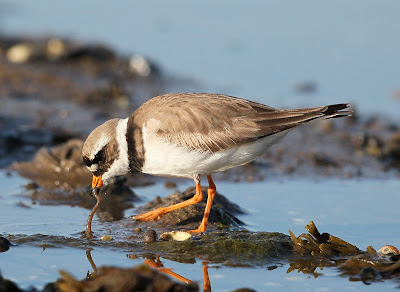We are excited to welcome back nesting shorebirds to the Reserve. Ringed Plover have already laid clutches of eggs while Little Terns have been seen prospecting over two of their nesting sites. It's an exciting time of year at Lindisfarne NNR.
Little Terns are
the second-rarest nesting seabird in the UK, and a Schedule 1 species. This
gives them special legal protection and means it is a criminal offence to
disturb them. They migrate all the way from West Africa to nest on our sandy shores.
The small charismatic waders Ringed Plover have been forming
their territories since February. Unlike Little Terns, they do not nest in
colonies but are spread out along the sandy coastline. Like many UK waders,
they have seen steep declines in their breeding success.
 |
| Ringed Plover © JJD |
From May until the beginning of August, wardens will be
protecting nesting areas across the Reserve – monitoring the birds and talking
to members of the public. Areas will be fenced off and access restricted in
some areas over these months. People can help protect these special birds by
respecting the fenced off areas, keeping dogs on short leads on the Reserve,
and walking on the wet sand wherever possible.
Lead Shorebird Warden Katherine Dunsford says “I’m really
looking forward to the coming season. We are hoping this year to build on the
successful 2018 breeding season. A big factor in their breeding success last
year was the refuge offered by the fenced off areas, which gave them places to
safely rest and rear their chicks without any disturbance.
“We understand the frustrations of not being able to access
some areas of the coastline. However, these birds are in decline and need our
help. The greatest threat to the breeding success of shorebirds is human and
dog disturbance.”
Katherine explains: “The birds lay their eggs in hollows
that they form in the sand, called ‘scrapes’. They are so well camouflaged that
a stray foot or paw might easily wipe out the breeding success of a pair.”
Northumberland is a wonderful area both to live in and for
tourism, with its long sandy beaches being a particular draw. However,
increased human and dog disturbance means that we are compelled to take
additional steps to protect our nesting shorebirds. For more information on
Lindisfarne National Nature Reserve’s Shorebird Protection Scheme contact the
Reserve office on 01289 381470.
 |
| Little Tern © Elizabeth Dack |

No comments:
Post a Comment